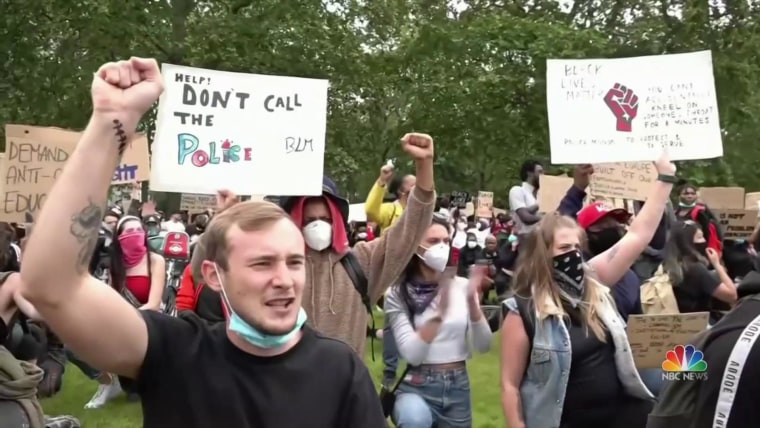But while hooliganism within English soccer has been confined to the fringes in recent decades, abuse aimed at Black players — both in stadiums and on social media — remains a problem to this day.
“The evidence of racism in English football speaks for itself,” said Dr. Jamie Cleland, a British researcher who studies racism in sport at the University of South Australia.
“Yes, the racist abuse inside stadia has decreased from the hostile environment of the 1970s and 1980s, but we still see it,” he said. “We’ve also now got the advent of social media where a lot of racist abuse goes on.”
This season, a number of stars, including Manchester City and England striker Raheem Sterling, have spoken out about the racism they’ve experienced both online and during games. On Tuesday Sterling posted a video featuring several big-name soccer stars voicing their opposition to racism.
“Fundamentally, we still have issues that exist in our game that we've never eradicated and we need to make a priority,” said Troy Townsend, head of development at Kick it Out, English soccer’s equality and inclusion organization. He is also the father of Andros Townsend, the Crystal Palace and England player who’s played almost 300 professional games.
“When you work in the space that I do, you kind of realize, how far have we really come?” Townsend said.
Both Cleland and Townsend point to the predominantly white crowds visible at most Premier League stadiums — often based in cities with significant racial diversity — as evidence that more needs to be done to ensure Black and minority ethnic fans feel comfortable attending games.
“The Black fan has never really felt safe or comfortable,” Townsend said. “You scan a stadium and you can see the lack of representation.”
“Football needs to reflect and look at how it encourages more fans from different backgrounds and different ethnicities to be able to feel they can go to a stadium,” he added.
But it’s not just fans, teams and the league itself also need to look at the “structural racism” within their hierarchies, Cleland said.
“There’s a significant number of Black players, but are they being given opportunities to coach or manage at high levels in English football? I think the proof is in the pudding.”
Nuno Espirito Santo, of Wolverhampton Wanderers, is the only top Black coach in the Premier League at present. The top coaches of the other 19 teams are white. Affirmative action could be required to tackle the lack of representation, Cleland suggested.
“There has been talk of incorporating this ‘Rooney Rule’ where they have to shortlist at least one minority ethnic candidate candidate per senior coach position, which has been obviously very effective in the NFL,” he said.
“There's lots of resistance to it,” he added, “but then you've only got to look at the governance structure of English football to find that it's very much populated by white men.”
Townsend also points to the “embarrassing” low level of Black and minority ethnic representation on Premier League team boards.
“That’s something that the game has to be challenged on and the game has to address.”
Nevertheless, allowing players to display “Black Lives Matter” is a decisive moment in the fight to address racism in the game, Townsend said.
“It's a message from the players and the authorities within the game that actually Black lives do matter, and they'll be making a real change about how they represent those Black lives within their industry,” he said.
"how" - Google News
June 17, 2020 at 04:40PM
https://ift.tt/3ddhSB4
English soccer's push to fight racism is reminder of how long it has plagued the game - NBC News
"how" - Google News
https://ift.tt/2MfXd3I
Bagikan Berita Ini















0 Response to "English soccer's push to fight racism is reminder of how long it has plagued the game - NBC News"
Post a Comment